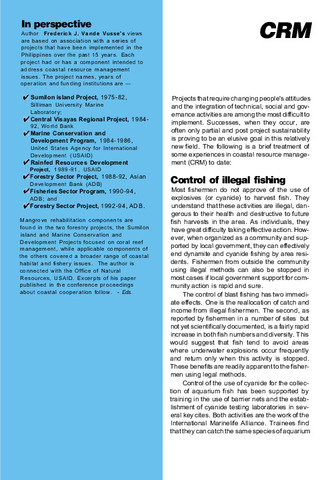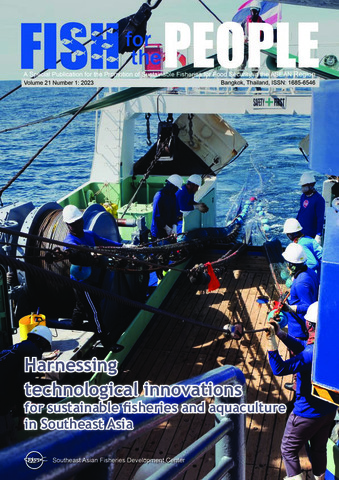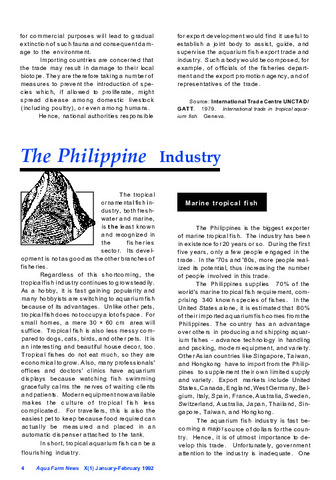| dc.contributor.author | Dickson, Alma C. | |
| dc.date.accessioned | 2018-12-05T08:59:37Z | |
| dc.date.available | 2018-12-05T08:59:37Z | |
| dc.date.issued | 1997 | |
| dc.identifier.citation | Dickson, A. C. (1997). Training and extension on selective fishing in the Philippines. In Proceeding of the Regional Workshop on Responsible Fishing, Bangkok, Thailand, 24-27 June 1997 (pp. 375-388). Samut Prakarn, Thailand: Training Department, Southeast Asian Fisheries Development Center. | en |
| dc.identifier.uri | http://hdl.handle.net/20.500.12067/767 | |
| dc.description.abstract | Effective conservation and management of the Philippine fishery and aquatic resources must be given due considerations. The Code of Conduct for Responsible Fisheries specifically on Article 7, Section 7.1.1 on Fisheries Management emphasized that the States and all those engaged in fisheries management through appropriate policy, legal and institutional framework should adopt measures for long term conservation and sustainable use of fisheries resources in all political units whether at local, national, subregional or regional levels. Article 8 on Fishing Operations Section 8.1.7 mentioned also that the States should enhance the skills of fishers through appropriate education and training programs which are agreeable to international standards and guidelines; Article 8.5 on Fishing Gear Selectivity, Section 8.5.2 contain that in order to improve selectivity, States should continue drawing up laws and regulations and shall take into account the range of selective fishing gears, methods and strategies available to the industry. The marine fisheries in the Philippines at present is on its crucial stage in view of the overexploitation of majority of the fishery resources and fishing grounds in coastal areas. The fisherfolk in the coastal ecosystem suffered from the destruction caused by illegal fishing practices such as the use of active and exploitative fishing gears/accessories (e.g. trawl, halide lamp in municipal waters), occurrence of cyanide and dynamite fishing, red tide bloom and fish kills. More likely the management of offshore waters should be looked into to avoid further degradation of resources. In view of these situations, sustainable fishing operation techniques as well as programs/strategies to conserve, rehabilitate and manage the country s overall fishery and aquatic resources should be introduced through training and extension as management support strategies. The Training Program component is comprised of knowledge, skills and competencies development and upgrading; preparation of project models; establishment of pilot demonstration project and monitoring and evaluation of the project results and impacts. The Extension Program component includes technical assistance; management and operation of pilot demonstration projects; provision of support services and credit facilities. | en |
| dc.language.iso | en | en |
| dc.publisher | Training Department, Southeast Asian Fisheries Development Center | en |
| dc.subject | Philippines | en |
| dc.title | Training and Extension on Selective Fishing in the Philippines | en |
| dc.type | Conference paper | en |
| dc.citation.spage | 375 | |
| dc.citation.epage | 388 | |
| dc.subject.asfa | fishery management | en |
| dc.subject.asfa | sustainable fishing | en |
| dc.subject.asfa | sustainability | en |
| dc.subject.asfa | training | en |
| dc.subject.asfa | capacity building | en |
| dc.subject.asfa | education | en |
| dc.subject.asfa | extension activities | en |
| dc.subject.asfa | fishery resources | en |
| dc.subject.asfa | policies | en |
| dc.subject.asfa | Fishery policy | en |
| dc.subject.asfa | gear selectivity | en |
| dc.subject.asfa | fishing grounds | en |
| dc.subject.asfa | marine fisheries | en |
| dc.citation.conferenceTitle | Proceedings of the Regional Workshop on Responsible Fishing, Bangkok, Thailand, 24-27 June 1997 | en |



